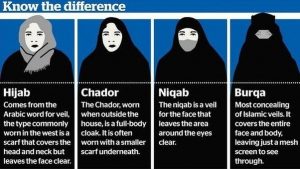Podcast: Play in new window
Subscribe: Apple Podcasts | RSS | More
Aodhán Ó Ríordáin is a Labour Party senator and former TD.

Aodhán Ó Ríordáin
*****
I wanted to comment a bit about the controversy that blew up in the UK last week about Boris Johnson’s comment about Muslim women who wear burkas.
Boris Johnson, in case you don’t know, is the Tory Brexiteer who resigned in protest that Prime Minister Theresa May’s Chequers plan wasn’t hardline enough. Now, everything about Johnson’s behaviour in regards to Brexit suggests that he has little or no principled beliefs on the matter and is just using it as a leverage to try to get himself into her job, but that’s a different story.
Johnson started a controversy when he said that women who wear the niqab or burka look like bank robbers or letterboxes.
Let’s be clear about terms here, by far the majority of Muslim wo
men who wear headscarves wear a hijab, or something similar, which basically covers their hair and neck. Some go further and wear a niqab, which includes a veil which exposes only their eyes, and the most extreme, notably in Afghanistan under the Taliban, wear a burka, which even covers the eyes with a semi-transparent gauze.
It’s worth noting that women covering their hair is by no means confined to the Islamic world. It’s common in more traditional areas, like in Greece or Armenia – both Christian – for women to wear scarves in public. It’s pretty common in Russia too, particularly in more rural areas, and it would have been quite normal in Ireland up to maybe 50 years ago.
I have a couple of views about this. Firstly, for people in the west, I don’t like the idea of people wearing special clothes to mark out the fact that they are of a minority religion. I don’t confine that to Muslim women; the right-wing American commentator Ben Shapiro has defended the right of Muslim women to wear the hijab, pointing out that he wears a kippah, the Jewish skullcap. I disagree with Muslim women wearing a hijab in public, I disagree with Ben Shapiro or other Jewish men wearing a kippah in public, because I think that it is bad for the cohesion of society to have some people marking themselves out as not ‘normal’, with the rest of us by corollary, being ‘normal’.
To be clear, I think that people have the right to wear a kippah or a hijab, I don’t want any laws to prevent them from wearing them, they have a perfect right to make that choice; but I have a right to disagree with that choice.
But I think that the niqab and the burka are in a different class. They both create a barrier between people. And it’s not a symbolic barrier like a kippah or a hijab. It’s literally a physical barrier that comes between members of society. Facial expressions are an incredibly important component of communication, whether it’s between a parent and their kid’s teacher, neighbours saying hello as they take out the rubbish, or a barista and someone ordering a coffee.
In a society where trust and community are in short supply, blocking the communication of facial expressions has the potential to exacerbate tensions in a way that we don’t need.
That said, I don’t think that we should ban the niqab or the burka. I disagree with them, but I disagree with a lot of things, and I don’t expect my personal standards to be enforced on everyone else by the government. I can see a case for prohibiting face coverings that could amount to a disguise in some high-security zones, but apart from that, I believe in individual rights.
So you might think that I agree with Boris Johnson.
Well, no. I don’t believe that Boris Johnson has been struck by a sudden concern for security. Boris Johnson is a cynical and manipulative politician. He quit Theresa May’s cabinet because he thinks it’s a good manoeuvre to eventually get her job. He wants to keep himself in the news, and he wants to appeal to a certain wing of the conservative party so he made this statement, knowing the attention that it would gather him.
If you think that he cares about this issue, don’t kid yourself. You can be sure that this isn’t coming from a concern for security either. There was no talk about the danger of wearing motorcycle helmets or Halloween masks in secure areas.
Johnson made this statement because, given the constituency that he is appealing to, bashing Muslims is a popular thing to do. If he was sincere, he could have made jokes about how silly orthodox Jews look with idiosyncratic hairstyles and black clothes. But going after Jews doesn’t fit his purpose, at least not yet.
So when I hear about an argument over whether Johnson is right that Muslim women’s face coverings have no place in the western world, or that Johnson trying to stir up sectarian bigotry for his own political ends, I don’t see a contradiction there. I think they both are true.








